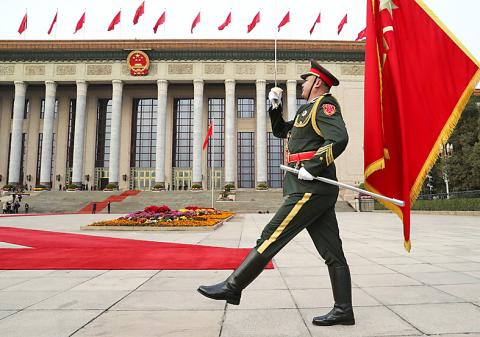The Pentagon on Tuesday released a report that lays out US concerns about China’s growing military might, underscoring worries about a possible attack on Taiwan.
The key concern is that as China upgrades its military equipment and technology, and reforms how it trains and develops troops, it becomes more confident in its ability to wage a regional conflict, a senior US defense intelligence official told reporters.
Beijing has made it clear that asserting sovereignty over Taiwan is its top priority, they said.

Photo: AP
Although China could easily fire missiles at Taiwan, it does not yet have the military capability to successfully invade, the official added.
They spoke on condition of anonymity to provide more detail on intelligence findings in the report, which was written by the US Defense Intelligence Agency.
Its release came a week after Chinese President Xi Jinping (習近平) called on the Chinese People’s Liberation Army (PLA) to better prepare for combat.
The report talks broadly about the steps China is taking to modernize its military and expand its operations around the globe.
The worry is that China would reach the point where leaders would decide that using military force for a regional conflict is more imminent, the official said.
“Beijing’s long-standing interest to eventually compel Taiwan’s reunification with the mainland and deter any attempt by Taiwan to declare independence has served as the primary driver for China’s military modernization,” the report says. “Beijing’s anticipation that foreign forces would intervene in a Taiwan scenario led the PLA to develop a range of systems to deter and deny foreign regional force projection.”
The PLA is “likely to grow even more technologically advanced, with equipment comparable to that of other modern militaries,” it said.
The US official said that China has been working hard on developing ways to combine cyberattacking capabilities with kinetic weapons.
However, Beijing would face a significant challenge as it tries to bring generational change to its military, they added.
China has mainly done tightly controlled regional operations and some counterpiracy missions, but it would be more difficult to create a joint force capable of conducting large, complex combat operations far abroad, the official said.
Ministry of National Defense Major General Chen Chung-chi (陳中吉) said that Taiwan watches the development of Chinese military capabilities more closely than any other nation.
“However warfare could play out, that is how we train,” Chen said on the sidelines of a simulated drill at the Hsinchu Air Base to reinforce the military’s defense capabilities ahead of the Lunar New Year holiday.
Additional reporting by Aaron Tu

Tropical Storm Gaemi strengthened into a typhoon at 2pm yesterday, and could make landfall in Yilan County tomorrow, the Central Weather Administration (CWA) said yesterday. The agency was scheduled to issue a sea warning at 11:30pm yesterday, and could issue a land warning later today. Gaemi was moving north-northwest at 4kph, carrying maximum sustained winds near its center of up to 118.8kph and gusts of 154.8kph. The circumference is forecast to reach eastern Taiwan tomorrow morning, with the center making landfall in Yilan County later that night before departing from the north coast, CWA weather forecaster Kuan Shin-ping (官欣平) said yesterday. Uncertainty remains and

SEA WARNING LIKELY: The storm, named Gaemi, could become a moderate typhoon on Wednesday or Thursday, with the Taipei City Government preparing for flooding A tropical depression east of the Philippines developed into a tropical storm named Gaemi at 2pm yesterday, and was moving toward eastern Taiwan, the Central Weather Administration (CWA) said. Gaemi could begin to affect Taiwan proper on Tuesday, lasting until Friday, and could develop into a moderate typhoon on Wednesday or Thursday, it said. A sea warning for Gaemi could be issued as early as Tuesday morning, it added. Gaemi, the third tropical storm in the Pacific Ocean this typhoon season, is projected to begin moving northwest today, and be closest to Taiwan on Wednesday or Thursday, the agency said. Today, there would likely

DISRUPTIONS: The high-speed rail is to operate as normal, while several airlines either canceled flights or announced early departures or late arrivals Schools and offices in 15 cities and counties are to be closed today due to Typhoon Gaemi, local governments announced last night. The 15 are: Taipei, New Taipei City, Taoyuan, Tainan, Keelung, Hsinchu and Kaohsiung, as well as Yilan, Hualien, Hsinchu, Miaoli, Chiayi, Pingtung, Penghu and Lienchiang counties. People should brace for torrential rainfall brought by the storm, with its center forecast to make landfall on the east coast between tonight and tomorrow morning, the Central Weather Administration (CWA) said. The agency issued a sea warning for the typhoon at 11:30pm on Monday, followed by a land warning at 11:30am yesterday. As of

CASUALTY: A 70-year-old woman was killed by a falling tree in Kaohsiung as the premier warned all government agencies to remain on high alert for the next 24 hours Schools and offices nationwide are to be closed for a second day today as Typhoon Gaemi crosses over the nation, bringing torrential rain and whipping winds. Gaemi was forecast to make landfall late last night. From Tuesday night, its outer band brought substantial rainfall and strong winds to the nation. As of 6:15pm last night, the typhoon’s center was 20km southeast of Hualien County, Central Weather Administration (CWA) data showed. It was moving at 19kph and had a radius of 250km. As of 3pm yesterday, one woman had died, while 58 people were injured, the Central Emergency Operation Center said. The 70-year-old